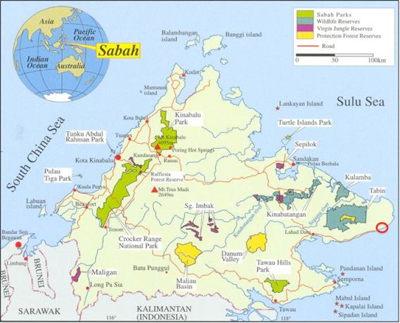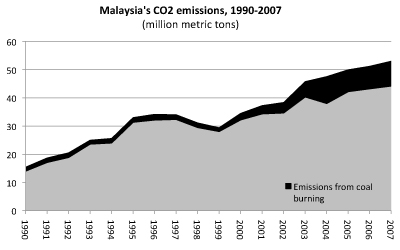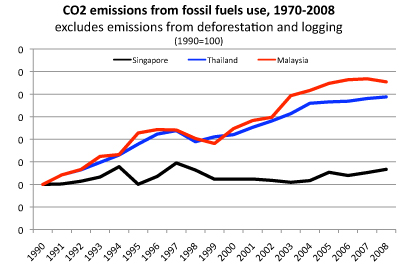Allegations of government corruption and corporate kick-backs are swirling around a planned 300 MW Chinese coal plant in the Malaysian state of Sabah.
While the plan to build the coal plant in Lahad Datu Bay has come up against strong and unrelenting grassroots opposition, the federal government continues to largely turn a deaf ear to opposition, arguing that the energy plant is necessary to power Sabah and stop blackouts. However, critics say the coal plant—which is to be built on the edge of the Coral Triangle and 20 kilometers from Tabin Wildlife Reserve—will damage fish stocks with chlorine and thermal discharges, upend the lives of locals dependent on fishing, and devastate eco-tourism in the region. In addition, the coal plant goes directly against Prime Minister Najib Tun Razak’s agreement at Copenhagen to reduce the country’s carbon emission intensity by 40 percent by 2020.
Despite these clear concerns—and increasing opposition—sources who spoke on the condition of anonymity say the plant has continued to move ahead due to government nepotism, corruption, and kick-backs. In fact, sources say the federal government has already paid out nearly a quarter of the cost of the coal plant to the contracted company, China National Electric Equipment Company (CNEEC).
Woe to journalists
Malaysia is not an easy place to find answers about behind-the-doors government deals. In fact, finding answers in some situations can actually be against Malaysian law.
 The circle denotes the coal plant. Tabin Wildlife Reserve is to the west, Semporna (Tun Sakaran Marine Park) is to the south. Map courtesy of Green SURF. |
“Malaysia has some laws that make it almost impossible for journalists to find out stuff about people in power. Reporters here can be charged if they do get hold of info, and if it is published,” a source told mongabay.com, adding that such charges fall under Malaysia’s Official Secrets Act. A citizen can also be held for up to 60 days without seeing a courtroom if it’s said they threatened national security, according to the Internal Security Act.
Newspapers are also tightly tied to the government in Malaysia. Under the Printing Presses and Publications Act, newspapers must be issued annual permits by the Malaysian Home Ministry. If a paper reports on something the government is unhappy with it can order the paper to close down within 24 hours.
“This is why investigative journalism is weak in Malaysia,” another source explains.
When asked why Malaysian newspapers are ignoring these connections, another source stated simply, “No one dares”.
Given the difficulty of obtaining information that the government doesn’t want aired, Malaysians are often left with speculation, rumor, and hearsay to offer explanations behind their government’s action. This is the case with the Sabah coal plant.

|
“It is like an open secret, but no one can confirm,” a source who wishes to remain anonymous said.
Sources say that the Malaysian government has already paid China National Electric Equipment Company (CNEEC) 400 million Malaysian ringgit ($125 million) in order to build the power plant.
“They probably signed it thinking that the project would be approved. Coal is after all listed in the country’s five-fuel policy,” said a source.
Yet the price of the coal plant continues to rise. When first proposed it was estimated a RM 1.1 billion then RM 1.3 billion for the second site, and now RM 1.7 billion. When asked why the plant had jumped RM 400 million from one site to the next, the sources had different answers. One said the rising price of raw materials was largely to blame, while the other said the money was used “[by the government] for buying favors or supports, even speculated for the [Barison Nasional, Malaysia’s ruling party] campaign of last election.”
To date, many details of the project remain obscured by government and corporate silence. No one knows if the total cost includes the cost of building a transmission line, or the route this transmission line will follow, though it could very possibly cut through rainforest. While the coal will be supplied by TNB Fuel Supplies, officials have also not shared which coal mines in Kalimantan will supply the plant or how long they plan to export coal from Indonesia. Environmentalists fear that if the plant goes ahead, it will spur coal mining in Sabah’s own backyard, upending the state’s last pristine ecosystems.

|
According to local activists, it doesn’t have to be this way. Compelled by social, environmental, and economic concerns, the organization Green SURF (Sabah Unite to Re-Power the Future) recently hired the Renewable and Appropriate Energy Laboratory (RAEL) at the University of California Berkeley to conduct an energy audit for Sabah. The audit found that power from either biomass or hydropower could provide the same power at a competitive price with coal. Geothermal and solar were slightly more expensive, but greener options.
However, if the allegations of government corruption are true—and we may never know for certain—then convincing the government to pursue a different course may prove next-to-impossible even for the most impassioned activists.
Related articles
Malaysia preparing to take big step backward on energy policy
(08/13/2010) I write to you as a deeply concerned and saddened citizen of Malaysia. For most of the 45 years of my life, I have been proud to be Malaysian. Recently, I have become heartbroken to be Malaysian. I am profoundly grateful to write this with the support of both my local communities in Sabah, Malaysian Borneo and California, U.S.A., and a larger world community. That said, I take full ownership of and sole responsibility for the views articulated in this letter; I express them from my stand as a mother, an earth citizen and a leader.
Environmental assessment for Borneo coal plant riddled with errors

(08/03/2010) The Detailed Environmental Impact Assessment (DEIA) for a proposed coal plant in Sabah is full of holes, according to activists with the organization Green SURF (Sabah Unite to Re-Power the Future), which opposes the plant. The official environmental report from Lahad Datu Energy lists species not endemic to Borneo, mistakes the nearest ecosystem to the coal plant, and confuses indigenous groups. Even more seriously, the DEIA leaves out information on the coal plant’s specifics and possible ‘green’ alternatives.
Fishermen express doubts about coal plant overlooking their fishing grounds

(06/13/2010) Local fishermen in the Malaysian state of Sabah are uncertain of their future, if the government pushes ahead to build a 300 megawatt coal power plant. They have been told they will be moved from their current seaside village to one deeper inland, and while the coal plant will provide manual labor work in its building stages, the fishermen express doubt about the impacts over the long-term effects of the coal plant on their livelihood. “Someone mentioned that maybe we have to move to Sungai Merah, which is quite far from our village. We are also worried because Sungai Merah is not next to the sea like [our village] is,” local fishermen, Ali Hia, told Green SURF and Save Sandakan members—two local organizations opposed to the coal plant—who recently visited the seaside village of Kampung Sinakut, site of the proposed coal plant.
Photos reveal paradise-like site for coal plant in Borneo

(05/21/2010) With the world’s eyes on the environmental catastrophe in the Gulf of Mexico, many are beginning to ponder the rightness of not just America’s, but the world’s dependence on fossil fuels. Yet large-scale fossil-fuel energy projects continue to march ahead, including one in the Malaysian state of Sabah on Borneo to build a 300 MW coal plant, which has come under fierce opposition from locals (already the project has been forced to move locations twice). The newest proposal will build the coal plant, as photos below reveal, on an undeveloped beach overlooking the Coral Triangle, one of the world’s most biodiverse marine environments, with transmission lines likely running through nearby pristine rainforest that are home to several endangered species, including orangutans and Bornean rhinos.
Analysis shows Borneo can say ‘no’ to coal power
(03/17/2010) Plans for a coal power plant in the Malaysian state of Sabah in northern Borneo have run into stiff opposition. Environmentalists say the coal plant could damage extensive coral reef systems, pollute water supplies, open rainforests to mining, and contribute to global climate change, undercutting Sabah’s image as a ‘green’ destination. The federal government contends that the coal plant is necessary to fix Sabah’s energy problems. However, a recent energy audit by the Renewable and Appropriate Energy Laboratory (RAEL) at the University of California Berkeley shows that pollution-intensive coal doesn’t have to be in Sabah’s future.
Malaysia and China agree to $11 billion deal to build mines, dams in Borneo
(01/13/2010) Malaysia and China today agreed to am $11 billion deal that will turn a vast area of Sarawak, a Malaysian state in northern Borneo, into an industrial corridor for mining and energy development, reports The Financial Times.
Coal plant could damage rainforest reserves, coral reefs, palm oil plantations in Malaysian Borneo
(12/20/2009) A proposed coal-fired power plant in Malaysian Borneo could damage the region’s world-renowned coral reefs, pollute air and water supplies, open Sabah’s biodiverse rainforests to mining, and undermine the state’s effort to promote itself as a destination for “green” investment and ecotourism, warn environmentalists leading an effort to block the project. The scheme, which is backed by the federal Tenaga Nasional Berhad and state energy company, Sabah Electricity Sdn. Bhd, has faced strong opposition and already been forced to re-locate twice since it was conceived more than two years ago. The 300-MW plant is now planned for a coastal area that is situated in the middle of the Coral Triangle/Sulu Sulawesi Marine Ecoregion, an area renowned for astounding levels of biodiversity.








